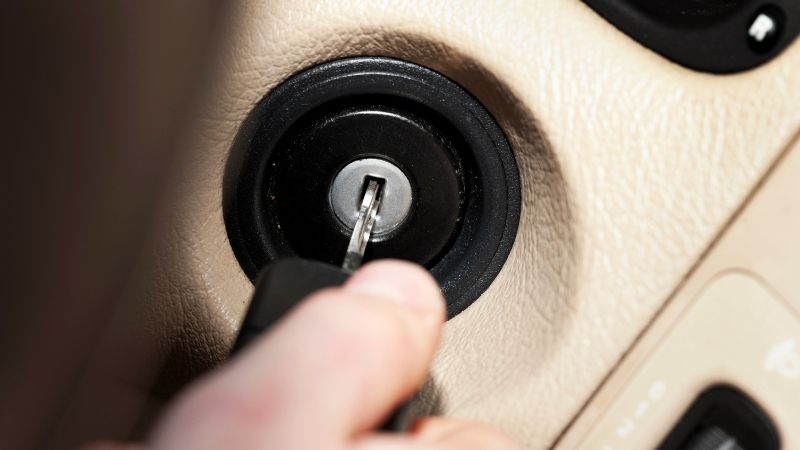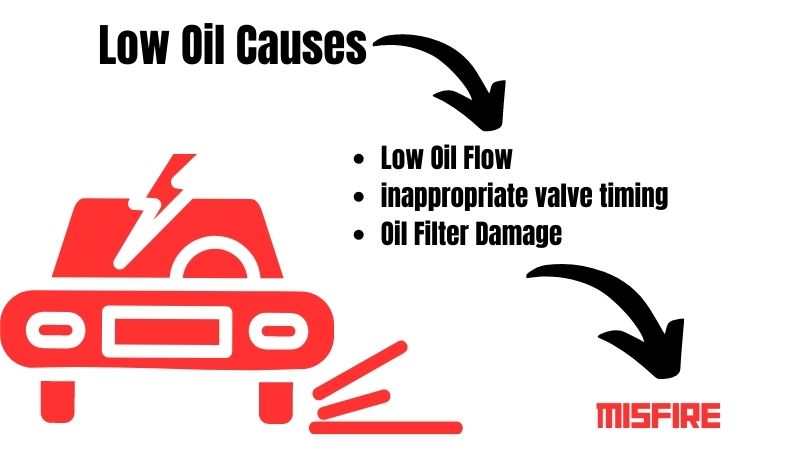Low motor oil can cause a misfire. And your vehicle’s low oil pressure was likely the cause of the misfire. Misfires and engine oil aren’t usually tied together, but it typically indicates a severe problem if you face it. So, if you notice misfires and low oil levels, you should first look at what could be causing it.
Low oil doesn’t specifically cause a misfire, but relatively low oil pressure. Nonetheless, the oil level must be common for lowering pressure; for this, your oil flow or other performance may decrease, creating a misfire.

How Does Low Oil Cause Misfire?
Low oil can cause misfires in a few ways: damaged oil filters, decreased oil flow, creating inappropriate valve timing, and resulting misfires.
Low Engine Oil Symptoms
Your engine consists of numerous moving metal parts that constantly rub against each other when the ignition is on. Oil lubricates these parts, allowing them to move without causing unwanted friction. Oil also helps dissipate heat. It keeps your engine elements cool and lets you function while driving.
If your oil is running low, that means there are signs that you should know. And you need to take action to prevent damage. The common low engine oil symptoms are:
- Oil Pressure Warning Light
- Burning Oil Smell
- Clunking Sound
- Less Efficient Performance
- Overheating Engine
Read Also: Overdue Oil Change Symptoms
Can Low Oil Pressure Cause Misfire?
Low oil pressure can cause problems like a noisy engine and engine vibration, but not a misfire. A misfire occurs when one or more cylinders do not produce power because of an insufficient combustion process. Or valve timing is not accurate.
However, most of the symptoms of low oil pressure overlap with engine misfires. Many automobile owners confuse low oil pressure issues with engine misfires.
Actually, if your oil level is not low, you may still have low oil pressure. So, let’s look at what else can cause a fire and more.

Other Common Possible Causes Of a Misfire
If your motor oil level isn’t critically low, the oil is not old; here are some other possible misfire causes.
Faulty Ignition System
Faulty ignition system elements are the number one reason for misfires. The spark plug is the cheapest and most straightforward part to replace related to this.
Still, they do not fail hard, and it’s probably the ignition coil. And finally, you may be thinking about faulty spark plug leads.
Faulty Fuel System
Fuel systems are the second most common cause of fires. Some possible faulty equipment includes a clogged fuel filter, bad injectors, and a fuel pressure regulator.
Any fuel system part not operating optimally or with a restricted flow will cause a fuel ratio. And that lean mixture can cause any cylinder to fire.
If you have doubt the ECU is faulty, you should inspect and clean its chassis grounding point and remove it.
Control Circuit Problems
All input and output engine management devices are connected through electrical circuits. Problems in these circuits, like loose connections and damaged wiring, can cause engine misfires. Knowing what an engine misfire looks like can alert you to problems quickly.
Blow Head Gasket
Under normal circumstances, a faulty head gasket is the least likely cause of a misfire. The reason is that it rarely fails. Nevertheless, the defective head gasket also can cause low motor oil and misfires.
A blown head gasket often leads to low engine oil and misfiring. If you are noticing misfires and your engine is consuming motor oil, this is the reason.
Emission Equipment Issues
Without catalytic converters, modern automobiles have an array of emission tools to decrease the pollution emitted into the atmosphere.
These include the exhaust gas recirculation system, oxygen sensor, and positive crankcase ventilation (PCV) system. In some cases, problems with emissions tools can prevent the engine’s air-fuel mixture from misfiring.
How do You Fix a Misfire Easily?
Replacing a poor vacuum line may solve the problem. Besides this, it may make the engine run better.
If the fuel pressure is low or uneven, the fuel system before the fuel rail causes a misfire. If so, you must replace the fuel filter or pump.
Frequently Asked Questions:
Q. Can Low Oil Cause Rough Idle?
Many things can cause your car to idle rough, and diagnosing the problem can be tricky. Some of them may be costly, others not.
If you have low oil, it can rough idle. Low oil affects how your engine performs at idle. Too little, and it won’t lubricate the pistons and will vibrate due to overheating.
Everyone knows changing the oil and filter on time is very important. This way, you’ll protect your engine from overheating. And you can remove small particles from getting into your oil filter.
Read Also: Low Oil Pressure at Idle: Causes & Repair Process
Q. Can No Oil Cause A Misfire?
When your car’s no oil, oil pressure can drop, and the vehicle can misfire. Additionally, you can fix the issue by increasing your oil level. But it would help if you investigated what’s causing the motor oil level to drop.
Can Low Oil Cause Check Engine Light To Flash?
Because of Low oil, your check engine light comes on. But it’s rare to cause flashing engine lights. If your engine light flashes, the engine is not running correctly. It’s because an electrical sensor on the machine has issued a warning.
For the low oil light to come on, it should be almost empty. It’s because oil provides lubrication and keeps the engine’s interior cool. Your engine temperatures can rise if they drop sufficiently.
Moreover, if the engine overheats due to oil, the heat will trigger an engine sensor, and light can flash.
Another reason is when the oil pressure drops suddenly. But this could be related to a severe accidental leak. Again the engine can be damaged without warning, and the vehicle cannot be driven.
Q. Can Low Oil Cause Loss Of Power?
If the engine breaks down due to a low oil level, your machine needs a costly repair. Low oil levels cause valves to burn, internal parts to heat up, seals to dry out, and eventually warp or break. Without braking, your engine will continue to lose power; this can burn more fuel while running poorly.
Q. Can Bad Oil Cause A Cylinder Misfire?
It primarily relies on the car, but the short answer is yes especially if the engine is furnished with inconsistent camshaft timing, as nearly all new-show vehicles are.
In that case, lousy oil can plug an oil control valve because these systems rely on oil pressure and flow to operate variable camshaft timing or lift control systems. Bad oil can prevent them from working correctly.
This can cause cylinder misfires and other erratic engine operations. If the computer doesn’t put the automobile into ‘limp mode’ first, it also can cause.
Final Word:
Can low oil cause a misfire? At the minimum mark on the dipstick, a slightly low oil level will rarely cause a fire. However, this can sometimes occur in cars with unstable valve timing.
But whatever the case, you should drain the motor oil immediately and notice if the misfires go away.
Overall, if your engine oil is critically low, your oil pressure is probably low, which can cause a misfire. Therefore, low oil pressure will destroy your engine, so don’t drive your car while it’s in that condition.
Read Also: What to Do If No Oil on Dipstick
